- Last Updated: January 15th, 2026
Key Takeaways
Snapchat is being sued by families who say the app allowed drug dealers to sell fentanyl to minors, leading to overdoses and deaths.
The lawsuit claims that Snapchat's features facilitate illegal drug transactions and that the platform has not done enough to protect its users from harm.
Legal arguments against Snapchat include a lack of effective parental controls, anti-drug policies, and negligence in monitoring content, which could have prevented illicit activities.
Overview of the Snapchat Lawsuit
On this page, we’ll provide an overview of the Snapchat lawsuit, evidence of Snapchat’s harmful effects on youth mental health, details on how to file a Snapchat lawsuit, and much more.
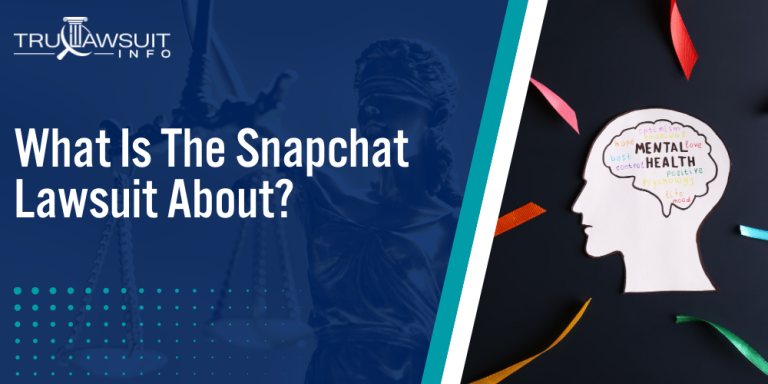
Intro to the Snapchat Lawsuit
Important considerations in the Snapchat lawsuit include, but are not limited to:
- Specific Claims: These can range from invasion of privacy to allegations that the app’s design contributes to psychological harm or addiction.
- Evidence Collection: Essential for substantiating claims, this might include digital records, user testimonials, and expert opinions on the app’s impact.
- Aiming for Resolution: Whether through settlement negotiations or court proceedings, the goal is to obtain fair compensation and, in some cases, to push for changes in Snapchat’s policies or practices.
If you or a loved one have experienced mental health issues after using social media, you may be eligible to file a lawsuit.
Contact TruLawsuit Info for a free consultation, or use the chatbot on this page to learn more.
What Is The Snapchat Lawsuit About?
Question: What is the Snapchat lawsuit about?
The Snapchat lawsuit revolves around allegations that the platform enabled drug dealers to reach minors.
Snapchat is a popular social media platform known for its unique features like automatically deleted messages and geolocation functionality.
The Snapchat lawsuit has caught attention nationwide as it addresses challenging questions about social media companies’ responsibility to monitor and control content shared on their platforms.
Plaintiffs argue that the social media company has contributed to a youth mental health crisis by its failure to adequately protect young users from harmful content and interaction with illegal activity.
Legal Framework Impacting the Snapchat Lawsuit
The Snapchat Lawsuit presents a complex interplay of statutes and legal interpretation that could reshape the responsibilities of social media platforms.
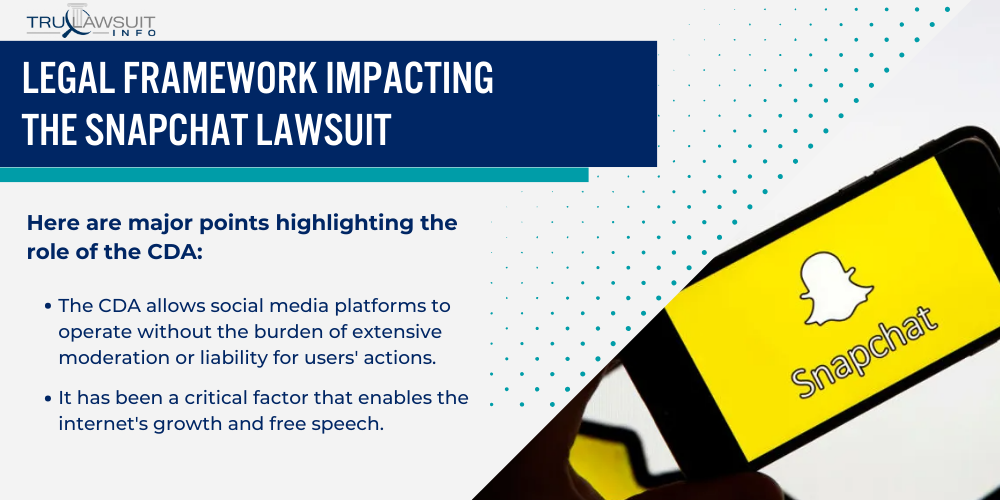
This section provides an overview of the influential legal components and recent judicial actions pertaining to the case.
Communications Decency Act Role
The Communications Decency Act (CDA) serves as a broad legal tool that shields online service providers like Snapchat from liability for user-generated content.
Specifically, Section 230 of the CDA states that “No provider or user of an interactive computer service shall be treated as the publisher or speaker of any information provided by another information content provider.”
Here are major points highlighting the role of the CDA:
- The CDA allows social media platforms to operate without the burden of extensive moderation or liability for users’ actions.
- It has been a critical factor that enables the internet’s growth and free speech.
- Critics argue that it gives platforms excessive freedom from accountability for harmful content.
- Support law enforcement efforts have been hindered by the protections given to platforms.
Key Allegations in the Snapchat Lawsuit
In recent lawsuits, the allegations claim that Snapchat’s design features have contributed to harmful user behavior.
Plaintiffs point to the ‘speed filter’ and ‘disappearing messages’ functions as being factually flawed and contributing to negligent outcomes.
The following allegations have been raised against Snapchat:
- The “speed filter” has allegedly encouraged reckless driving, resulting in accidents.
- Snapchat’s disappearing messages feature is claimed to facilitate illegal activities, such as fentanyl distribution.
- Plaintiffs state that these design choices constitute a form of negligence.
- The lawsuits assert that features should be designed with user safety as a top priority.
Judicial Interpretations
Recent rulings by federal and state judges in California have influenced the landscape of litigation against social media companies.
A federal judge struck down the broad immunity previously afforded under the CDA, while a California state judge enforced the notion that certain cases should proceed to trial.
Notable judicial interpretations include:
- A federal judge questioned the extent of immunity social media platforms should enjoy under the CDA.
- A California state judge ruled that the Snapchat lawsuit regarding the ‘speed filter’ may proceed to trial.
- These decisions suggest a shift towards holding platforms more accountable for the design and impact of their features.
- Support law enforcement efforts through legal action may become more viable if courts continue to challenge the protections of the CDA.
Snapchat Lawsuit's Impact on Social Media Platforms
The Snapchat lawsuit has highlighted significant challenges social media companies face regarding user safety and content moderation on their platforms.
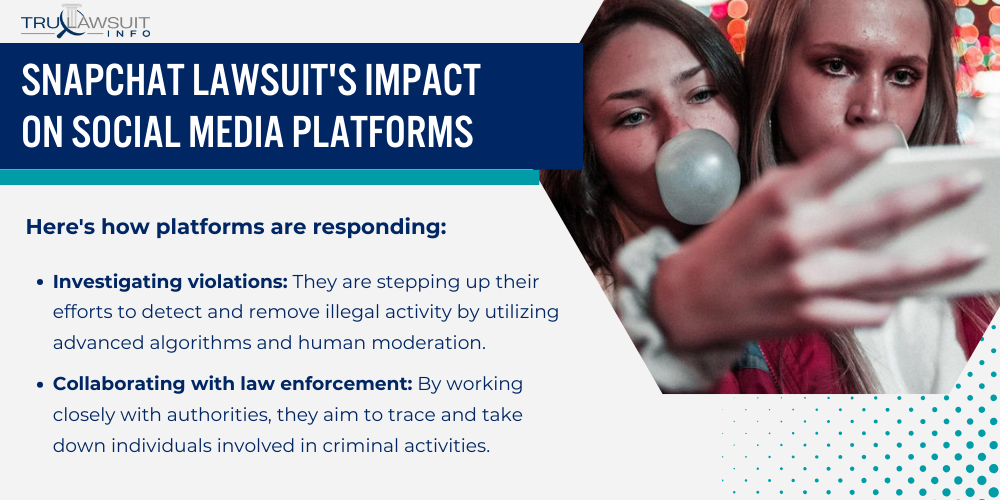
Efforts to Curtail Illicit Content
Social media platforms are under intense scrutiny as the Snapchat lawsuit brings to light the pervasive issue of illicit content, especially illegal drug sales and drug dealers’ activity.
Here’s how platforms are responding:
- Investigating violations: They are stepping up their efforts to detect and remove illegal activity by utilizing advanced algorithms and human moderation.
- Collaborating with law enforcement: By working closely with authorities, they aim to trace and take down individuals involved in criminal activities.
- Social Media Victims Law Center: This center plays a pivotal role in representing affected individuals and pushing for greater accountability from platforms.
- Enhancing user reporting tools: Social media companies are simplifying the process of users reporting suspicious or harmful content.
Potential Policy Changes
The legal pressures from the lawsuit may lead to substantial policy changes across various social media platforms.
Consider the potential shifts:
- Nip content moderation suits: Platforms might refine their moderation policies to avoid litigation, creating a safer online environment.
- Anti-drug policies: There could be stricter enforcement and clearer guidelines concerning anti-drug content policies.
- Implement effective parental controls: A push to safeguard younger users could result in stronger and more effective parental controls.
- Expose social media platforms: The case might force platforms to acknowledge their shortcomings and implement substantial reforms publicly.
The Role of Snapchat in Drug Trafficking
Snapchat has come under scrutiny for its role in illicit drug sales, particularly how it may facilitate sales of substances like fentanyl, which have, in several cases, proved fatal due to overdose.
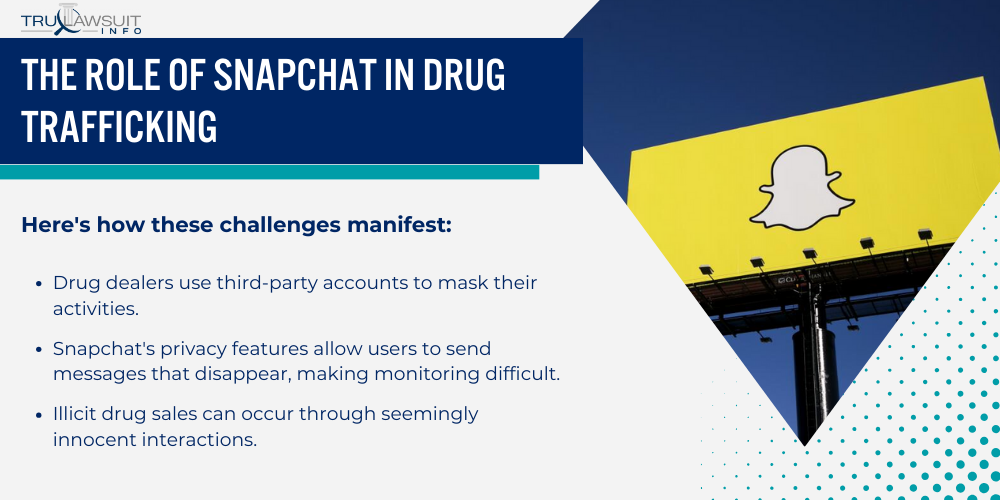
Monitoring and Preventing Drug Sales
Snapchat’s platform has been criticized for not doing enough to stop drug dealers from exploiting its features to identify and effectively circumvent attempts at regulation proactively.
Here’s how these challenges manifest:
- Drug dealers use third-party accounts to mask their activities.
- Snapchat’s privacy features allow users to send messages that disappear, making monitoring difficult.
- Illicit drug sales can occur through seemingly innocent interactions.
- The Snap Maps feature can be exploited to find and connect with prospective buyers.
- Snapchat has proactively rolled out tools to stop drug dealers, but challenges persist.
Case Studies and Reports
Social media platform Snapchat is connected to multiple fentanyl overdose cases, with drug transactions on the app leading to tragedy.
The specifics are:
- Several fentanyl overdose cases involve minors who used Snapchat to purchase fentanyl.
- Lawsuits allege that the app’s features allowed dealers to facilitate sales and target young users.
- Reports have highlighted how Snapchat’s design unintentionally assists in illicit drug sales.
- Investigations into Snapchat’s role in drug trafficking showcase the difficulties in tracing and stopping dealers.
Legal Precedents In the Snapchat Lawsuit
The Snapchat lawsuit has set critical legal precedents impacting user privacy and the responsibilities of social media companies.
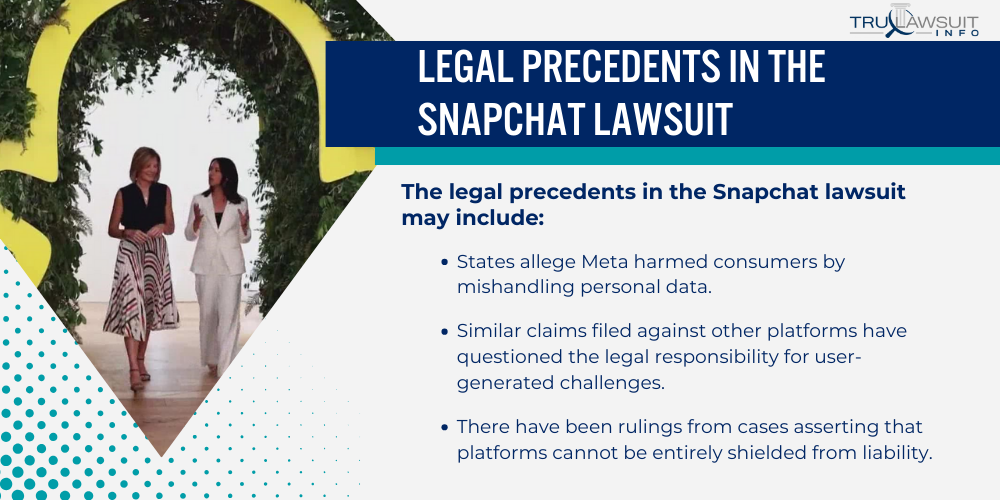
These cases shape the boundaries of what is permissible under the law regarding user interaction and platform accountability.
Past Lawsuits Against Social Media
In past litigation, social media companies have faced various suits over issues ranging from privacy breaches to negligence.
Legal precedents have been established through these cases, determining the extent to which companies like Meta Platforms are responsible for user content and behavior.
Specifically:
- States allege Meta harmed consumers by mishandling personal data.
- Similar claims filed against other platforms have questioned the legal responsibility for user-generated challenges.
- There have been rulings from cases asserting that platforms cannot be entirely shielded from liability.
Rulings and Outcomes
The outcomes from these lawsuits often serve as a compass for future legal battles involving social media entities.
Involvement by figures such as Superior Court Judge Lawrence P. Riff has also been pivotal.
Key outcomes include:
- Riff’s decision to allow lawsuits to proceed established that social media platforms could potentially be held liable for their design and algorithms.
- Acknowledgment that user privacy is paramount and companies must acquire proper consent to collect data.
- Establishment that platforms might have a duty of care to protect vulnerable users, particularly minors.
Consequences for Victims and Families
The lawsuits against Snapchat highlight the dire consequences faced by victims and their families.
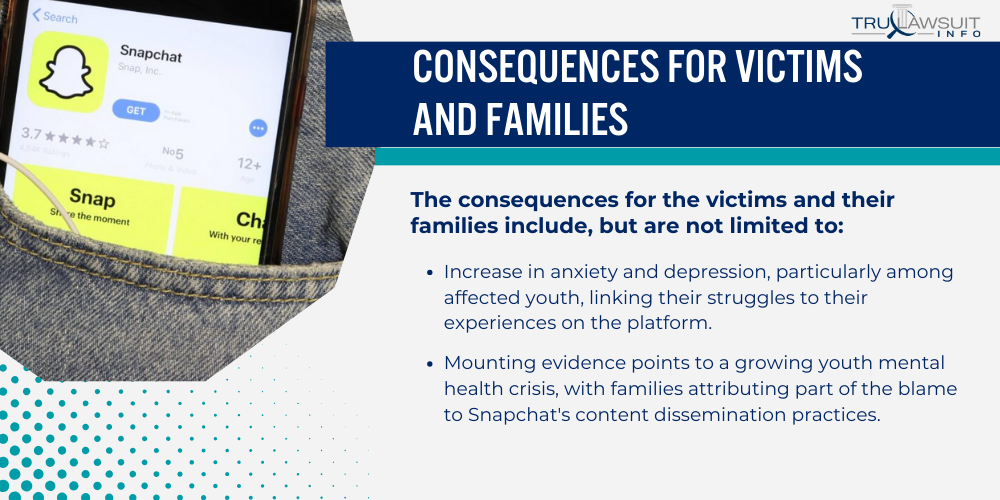
They often deal with long-lasting mental health repercussions and a relentless pursuit to hold Snap accountable for its role in these tragic occurrences.
Mental Health Considerations
Families have reported significant mental health impacts due to the algorithmic promotion of harmful content to young adults and individual internet users.
There is a document:
- Increase in anxiety and depression, particularly among affected youth, linking their struggles to their experiences on the platform.
- Mounting evidence points to a growing youth mental health crisis, with families attributing part of the blame to Snapchat‘s content dissemination practices.
- Stress disorders emerge among both direct victims and their families as they navigate the aftermath of harmful children’s online engagements.
- Concerns over the long-term psychological effects on survivors and family members as they cope with the loss or trauma associated with these cases.
Demands for Justice
The pursuit of justice by families manifests in several ways.
Below, the demands are outlined:
- Seeking accountability from Snapchat for not adequately protecting young users from drug-related content and interactions.
- Calling for comprehensive reforms in how Snapchat monitors and restricts content that can be detrimental to mental health.
- Demanding transparency in the platform’s algorithms and content promotion strategies to ensure they do not contribute to the youth mental health crisis.
- Advocating for support systems to be put in place for affected individuals, emphasizing the need for mental health resources.
Reactions and Responses to the Snapchat Lawsuit
Snapchat’s legal challenges have sparked a variety of reactions, ranging from public advocacy to industry analysis.
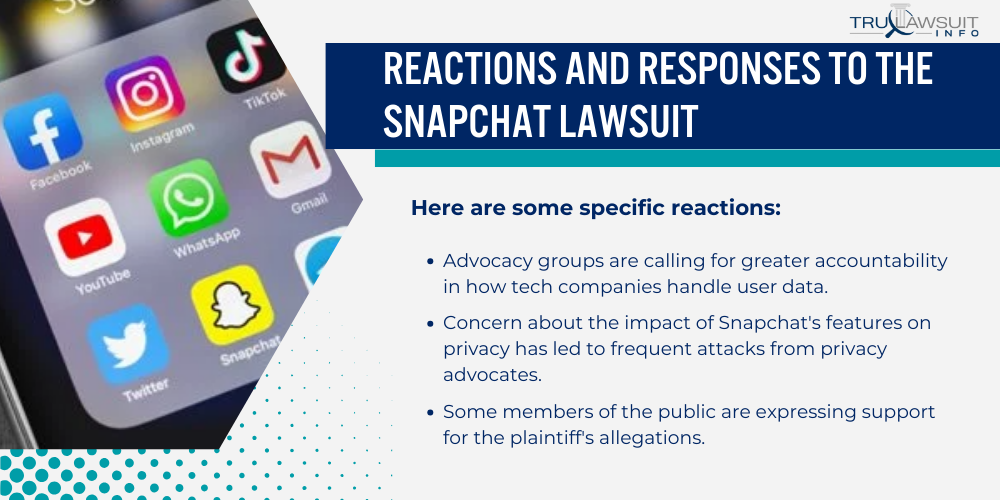
These responses shed light on the broad implications for privacy, corporate responsibility, and digital communication standards.
Public Opinion and Advocacy
Reactions from the public have been mixed, with concerns over privacy rights fueling advocacy groups to speak out.
Internet speech experts have highlighted that the lawsuit raises important questions about the intersection of technology and civil liberties.
Here are some specific reactions:
- Advocacy groups are calling for greater accountability in how tech companies handle user data.
- Concern about the impact of Snapchat’s features on privacy has led to frequent attacks from privacy advocates.
- Some members of the public are expressing support for the plaintiff’s allegations, while others are more sympathetic to the challenges of innovating in the tech industry.
Industry Perspectives
Within the industry, tech companies and review sites are closely watching the lawsuit, understanding that its outcome could influence product and business decisions.
Below are several industry perspectives:
- Tech industry leaders are considering the ramifications of the lawsuit on future business models.
- Other social media companies are likely reviewing their own policies and features to avoid similar legal challenges.
- This case has prompted industry-wide discussions on the balance between innovation and user protection.
- Ruling highlights from the case may inform how tech companies approach the development of new products.
Future Implications for Snapchat Inc.
The settlement of the Snapchat lawsuit underscores the potential for significant changes in Snapchat Inc.’s management of its platform and user interactions.
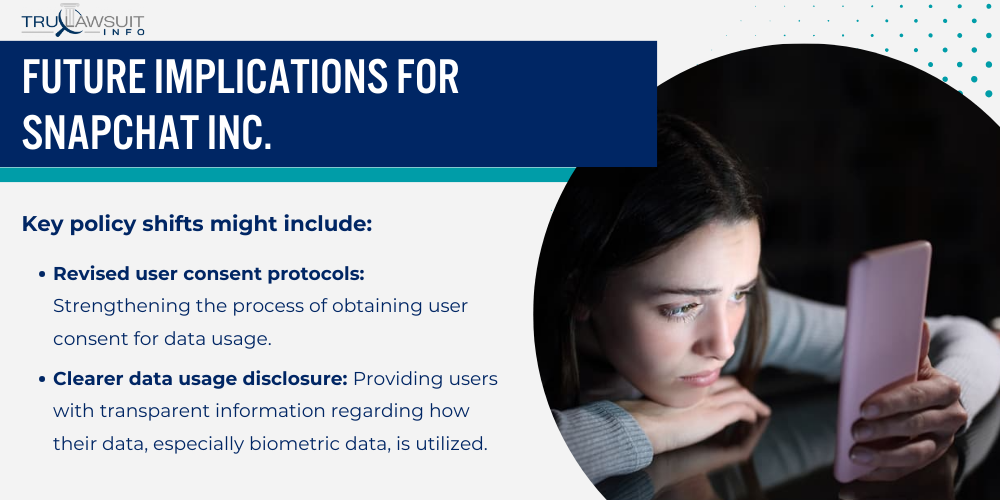
The company’s response may not only alter its operational policies but also affect user behavior and industry standards.
Changes in Platform Policies
Snapchat Inc. will likely enhance its privacy and data management policies, especially biometric data.
Enhanced privacy safeguards could foster trust among users and potentially set a precedent for other social media platforms.
Key policy shifts might include:
- Revised user consent protocols: Strengthening the process of obtaining user consent for data usage.
- Clearer data usage disclosure: Providing users with transparent information regarding how their data, especially biometric data, is utilized.
- Stricter content moderation: Implementing more rigorous methods to review the content, potentially impacting content moderation suits.
- Robust anti-drug policies: To prevent users from being inadvertently hooked on harmful content, Snapchat may bolster its stance against substance abuse-related content.
Impact on User Behavior
With heightened awareness of privacy concerns, there could be observable shifts in how users, particularly children and young people, engage with the app.
Anticipated behavioral changes include:
- Reduction in sharing: Users might share their appearance with less frequency due to privacy concerns.
- Opting out of features: Users may choose to disable features involving persistent mobile notifications or other intrusive elements.
- Demographic shift: A potential decline in teen users if privacy risks are deemed too high by parents or guardians.
- Critical evaluation of content: With better-informed user choices, the demand for responsible content may lead to more conscious consumption and sharing practices.
Frequently Asked Questions
-
To determine eligibility, individuals must typically have been directly affected by the issues cited in the lawsuit.
Specifically, in the Illinois case, residents could be eligible if they used the facial recognition feature.
-
The recent lawsuits allege that Snapchat’s features have led to serious consequences.
Claims include privacy infringement through facial recognition technology and mental health impacts leading to lawsuits from parents of affected children.
-
The expected payout date for the settlement has not been officially announced.
Claimants should monitor the case developments for the latest information on settlement distribution.
-
The settlement in Illinois involved a $35 million agreement due to the use of facial recognition technology without user consent.
Affected users in Illinois claimed this infringed upon their privacy rights.
-
The amount individuals could receive varies based on the specific terms of the settlement and the number of claimants.
In the Illinois lawsuit, users may receive a share of the $35 million settlement.
-
Snapchat faces a lawsuit for allegedly not preventing drug sellers posted content, leading to fentanyl overdoses.
This case highlights the platform’s responsibility to moderate harmful content and protect users.

Attorney Jessie Paluch, founder of TruLawsuit Info, has over 25 years of experience as a personal injury and mass tort attorney, and previously worked as an international tax attorney at Deloitte. Jessie collaborates with attorneys nationwide — enabling her to share reliable, up-to-date legal information with our readers.
Legally Reviewed
This article has been written and reviewed for legal accuracy and clarity by the team of writers and legal experts at TruLawsuit Info and is as accurate as possible. This content should not be taken as legal advice from an attorney. If you would like to learn more about our owner and experienced injury lawyer, Jessie Paluch, you can do so here.
Fact-Checked
TruLawsuit Info does everything possible to make sure the information in this article is up to date and accurate. If you need specific legal advice about your case, contact our team by using the chat on the bottom of this page. This article should not be taken as advice from an attorney.
You can learn more about the Social Media Harm Lawsuit by visiting any of our pages listed below:
Here, at Tru Lawsuit Info, we’re committed to helping victims get the justice they deserve.
To do this, we actively work to connect them with attorneys who are experts in litigating cases similar to theirs.
Table of Contents
Tru Lawsuit Info is a reliable source of information about issues that may affect your health and safety, such as faulty products, data breaches, and environmental hazards.
Our team of experienced writers collaborates with medical professionals, lawyers, and advocates to produce informative articles, guides, and other resources that raise awareness of these topics.
Our thorough research provides consumers with access to reliable information and updates on lawsuits happening around the country. We also can connect consumers with attorneys if they need assistance.
Here, at Tru Lawsuit Info, we’re committed to helping victims get the justice they deserve.
To do this, we actively work to connect them with attorneys who are experts in litigating cases similar to theirs.
